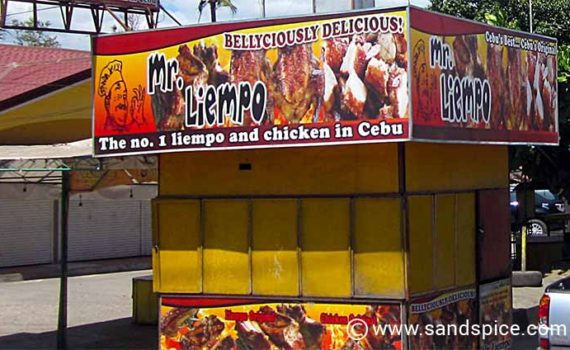
Bland Filipino Food 🥢
Before we started this trip, from our research we gathered that there was no distinctive Filipino cuisine. From our actual experiences in the Philippines, this appears to be true. On the menus everywhere you find pork and chicken, most often barbecued in a sweet and sticky marinade. This bland Filipino food is usually accompanied by heaps of plain boiled white rice.
Rarely if ever is the food spicy. Fish is available, but is always surprisingly expensive (I can’t get my head around this – the sea is close by almost everywhere in the Philippines). The food is often so bland we had to add lashings of hot tabasco sauce to give it some flavour (if any sauce was available).

Bland Filipino food: Lechon – with a sickly-sweet marinade
Eating bland Filipino food piles on the pounds
Of course you can eat local versions of foreign food, but why come to the Philippines to do that?
Usually, after a 4-week trip around South East Asia, we could expect to lose 2 or 3 kilos. After this trip around the Philippines, we managed to put on around 3 kilos each, despite the long walks we took each day.

Bland Filipino food – More calories ?… anyone… ?

Stick to the Fruit…
As a consolation, we were able to indulge in an abundance of delicious tropical fruit. The mangoes we ate in Moalboal were just about the best we’ve ever tasted. We were also able to get our hands on Soursop from supermarkets and food stalls in many places.
By far, the best food we had was prepared by Julian (a Brit) at the Seaside Boutique Hotel in Panglao. Using locally-sourced ingredients, he produced some delicious 3-course meals for us during our stay there.
If you enjoy Bland Filipino Food (!) check out Central Philippines – Cebu & Bohol. You may also like:





















4 Comments
McdonaldMenuPhilippines
January 29, 2024at 6:01 amMcDonald’s in the Philippines offers a diverse and delicious menu that caters to the local palate while maintaining the global appeal that the brand is renowned for.
SandSpice
January 30, 2024at 8:47 pmYep, McDonald’s is pretty popular in the Philippines. Try the local food and you’ll find out why.
Sonny Cruz
August 20, 2018at 3:25 pmRice as staple food goes well with crispy roasted pork called Lechon.
SandSpice
March 30, 2023at 8:59 pmSticky sweet lechon? Disgusting!